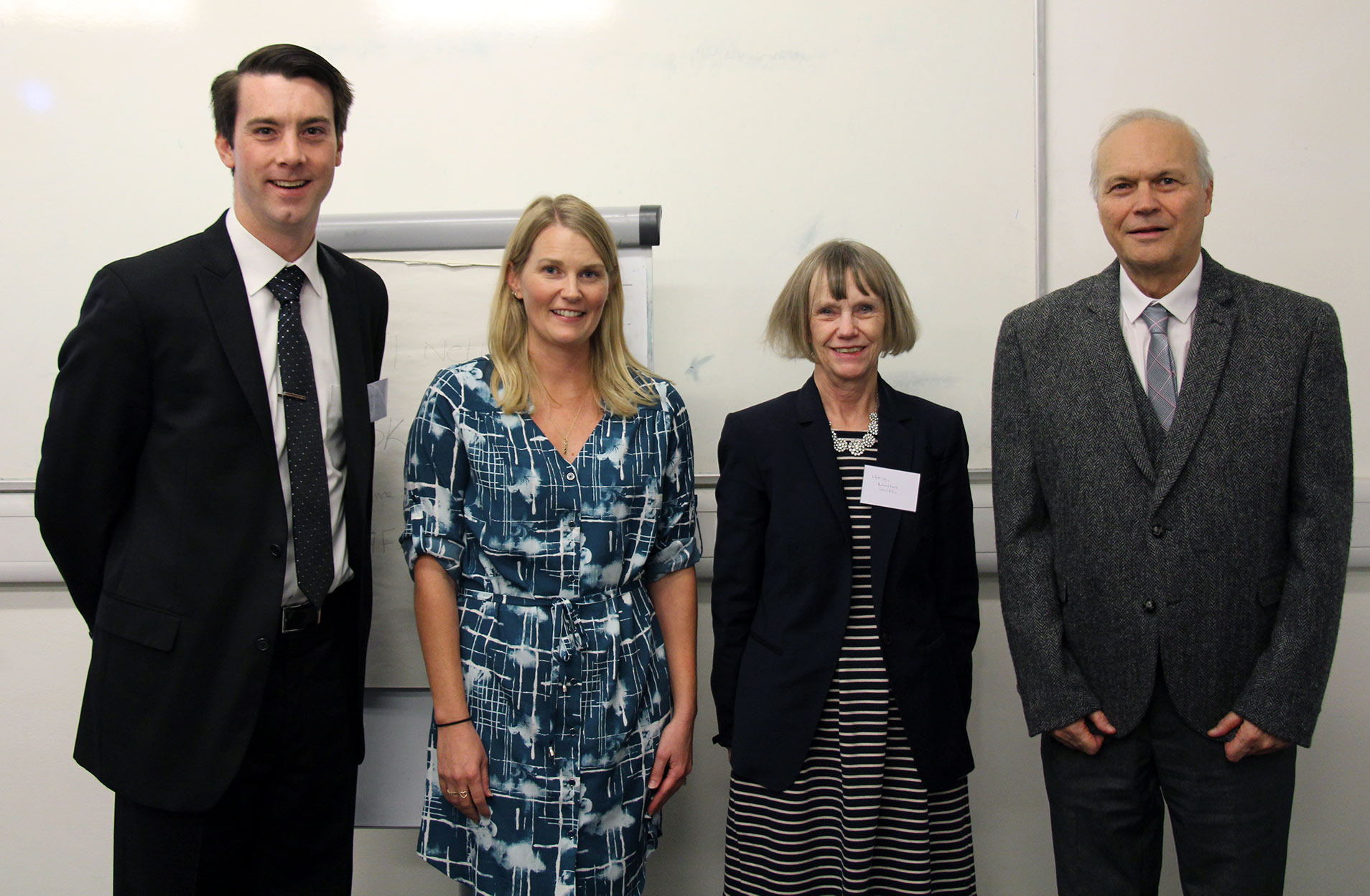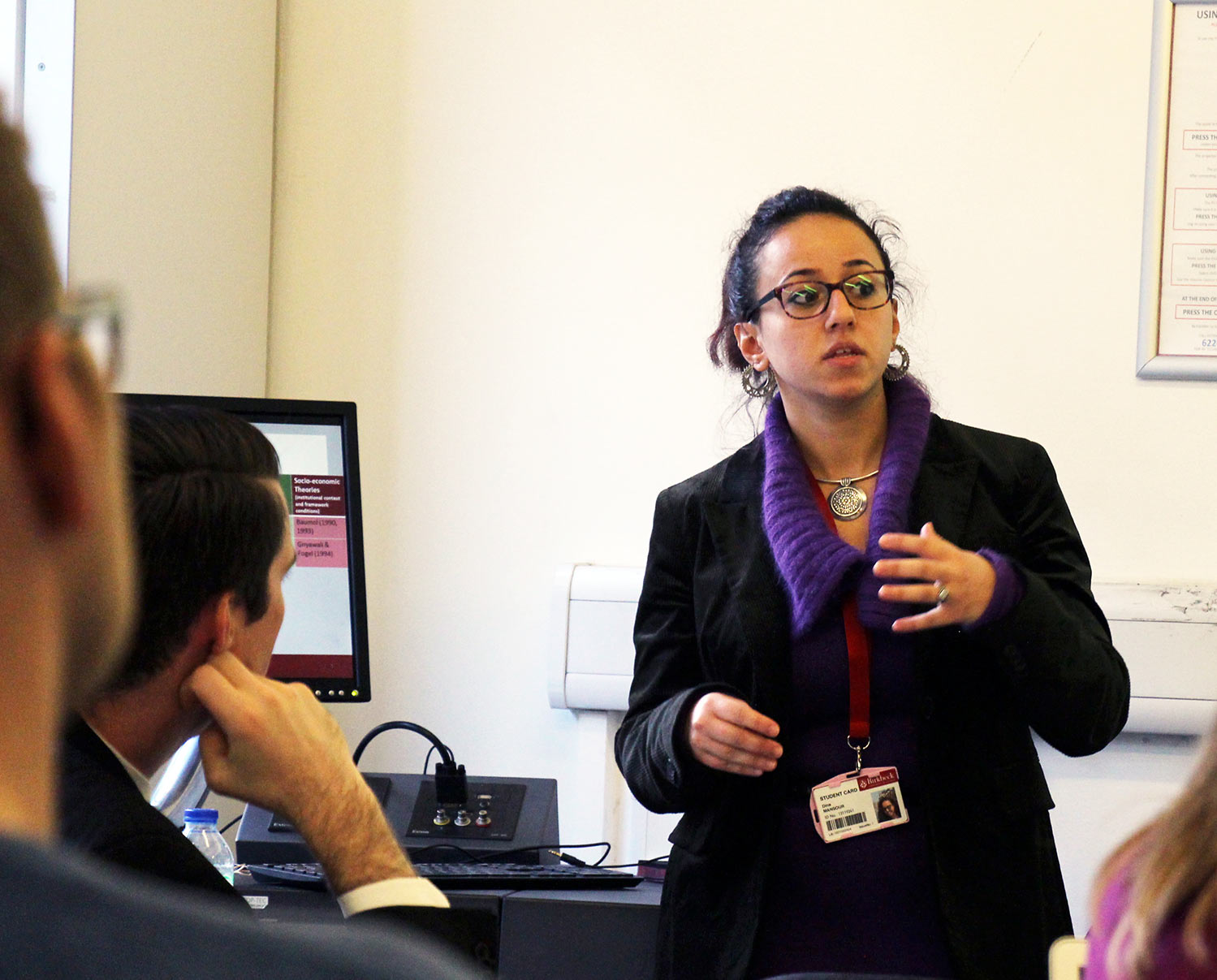This post was contributed by Prof Carlo Milana, Prof Helen Lawton Smith and Ning Baines of the Birkbeck Centre for Innovation Management Research (CIMR). The article focuses on a workshop held by the Centre on Friday 15 April titled ‘The Impact of Entrepreneurial Finance, Education and Religion on Entrepreneurship’, sponsored by Wiley
 Raising finance is critical for small firms and medium-sized enterprises (SMEs) to survive, innovate and grow. Innovation is typically underfinanced. In this workshop, attention was focused on the influence that entrepreneurial finance and other mitigating cultural factors such as education and religion may exercise on reducing risk in entrepreneurship in the current economic hardship.
Raising finance is critical for small firms and medium-sized enterprises (SMEs) to survive, innovate and grow. Innovation is typically underfinanced. In this workshop, attention was focused on the influence that entrepreneurial finance and other mitigating cultural factors such as education and religion may exercise on reducing risk in entrepreneurship in the current economic hardship.
Speakers:
- Jonathan Potter (OECD, Paris) Recent Market and Policy Trends in the Development of Mezzanine Finance and Hybrid Debt-Equity Instruments for SMEs.
- Victor Martin-Sanchez (King’s College, London) Unemployment and Growth Aspirations: The Moderating Role of Education
- Kwame Ohene Djan (University of Agder, Kristiansand, Norway) Does Religious Affiliation Influence the Design of Corporate Governance? Evidence from the Global Microfinance Industry
Chairs:
- Carlo Milana and Helen Lawton Smith

Mezzanine Finance and Hybrid Debt-Equity Instruments for SMEs
The first speaker Jonathan Potter presented recent and innovative work undertaken by the OECD on the Mezzanine Finance and Hybrid Debt Equity Instruments for SMEs. This is an area of financing that is relatively understudied and is one which is beset by ambiguity in definition. This ambiguity led to a series of challenges to the speaker on the nature and merits of mezzanine finance for SMEs.
Dr Potter explained that the SME sector is characterised by a wider variance of profitability and growth than large enterprises. Survival rate of SMEs is lower. It is difficult to distinguish the financial situation of the firm from its owners. Relations between the firm and its stakeholders are likely to reflect personal relationships to a higher degree than in larger firms. SMEs often obtain funds from informal sources. The problem of asymmetric information between the entrepreneur and the lender is more serious for small firms because of the blurring of the line between the firm and the entrepreneur. Various financial instruments can help overcome the asymmetric information and agency problems. An efficient financial system should have a range of instruments that matches needs of firms. If the right instrument is available for the risk/return profile the market could provide finance for a viable project.
Mezzanine finance is a hybrid instrument – typical mezzanine facility blends several instruments, such as subordinated loan (interest rate above senior loan; principal normally repaid at end as “bullet”), participation in ongoing revenue or profits, or participation in upside share price growth with equity “kicker” (commonly an “equity warrant” allowing purchase of shares at floor price, or equivalent remuneration). It operates in private capital market, in private investment partnerships (with up to about 100 private investors). Funds are supplied by private investors (Limited Partners) – high net worth individuals; family offices; pension funds; other institutions. It has a defined life span (5-10 years) – tend to select investees and do deals in first 3 years, then hold and close fund taking returns at around 8-10 years. At maturity fund, it is liquidated and money returned to investors. Rules are determined by market practice.
However, with uneven presence in OECD countries, commercial mezzanine tends to be focused on larger firms and leveraged buy-outs. It is not generally issued to SMEs with modest returns and which do not want to relinquish control. Public intervention may be needed to stimulate the sector and extend to SMEs, where the private sector does not provide funding. Public intervention mechanisms can be in the form of participation in the market through mandates to private funds; direct provision of funds to SMEs and guarantees/preferential funding of private investment companies.
Mezzanine financing therefore can respond to a market failure in finance for established companies in traditional sectors seeking to grow or effect transformations. It involves features that respond to asymmetric information and agency problems affecting SME finance, allowing higher returns without taking control. It is a relevant niche in the spectrum of finance instruments. Mezzanine finance can fill the gap as the SME owner not required to cede control, can pay the principal at the end, the investor accepts more modest returns but can take a share of the upside. It should lead to more growth in existing SME sector. The public sector can play a role in stimulating this part of the market. Several OECD countries found the instrument valuable, e.g. France, Germany, USA, but in half of OECD countries there was no public mezzanine programme and officials were not familiar with the product.
An issue raised in discussion was about the nature of the UK market and activities of the British Business Bank, particularly given their strong interest in developing this form of finance. It is also clear from the questions asked that there is more research to be done in this field in a number of ways. These include aiding understanding of the extent to which mezzanine can actually impact on earlier stage financing, and how and why it is suitable for firms in some sectors rather than others. And, more evidence was needed on how mezzanine actually operates in some (e.g. European countries) in practical terms and what lessons this might carry forward to future policy.

Unemployment and Growth Aspirations
Victor Martin-Sanchez’s theme was unemployment, entrepreneurial growth aspirations (EGA) and the moderating role of education. He argued that policies targeting human capital formation and entrepreneurial training contribute not only to enhance opportunity-seeking entrepreneurship, but also to territorial economic performance by enhancing the growth aspirations of entrepreneurs.
His research shows that the characteristics of the individual (founder/entrepreneur) and the environment in which the firm operates can act as drivers of EGA. However, during economic slowdowns, it is not clear how the interaction between entrepreneurs’ background and environmental conditions drives the EGA. The paper aims to investigate how an entrepreneur’s education and training shape the relationship between changes in unemployment rates, a variable that signals the economic and employment conditions, and EGA. Entrepreneurs’ judgmental decisions are actually beliefs or conjectures. The conjectures or beliefs depend on how they think the environment in which their firms operate will evolve. If those beliefs about new products or superior production processes are proved right, the entrepreneurs earn a profit; otherwise, they incur a loss. Through the different education processes, individuals gain knowledge and build mental frames and models used to interpret and make sense of the reality that surrounds them.
Education and entrepreneurship training experiences may enable entrepreneurs to gather and process information more efficiently. Accordingly different levels of education will be expected to moderate differently the way unemployment rate changes influence those entrepreneurs’ growth aspirations. Entrepreneurs with higher education are more likely to readjust accurately their conjectures or beliefs about the potential of their new ventures, in the light of changes in the environment. Individuals can learn opportunity‐seeking processes through the avenue of entrepreneurship training, thereby improving both the number of ideas generated and the innovativeness of those ideas. It has been commonly argued that economic crisis periods may destroy some of the old ways of doing business, while new alternatives for those who are able to identify them and dare to take them. The skills and knowledge gained through training in entrepreneurship help entrepreneurs to identify and pursue better opportunities, even in a difficult economic environment. It is shown that an increase in the unemployment rate reduces EGA. There is a connection between economic conditions and entrepreneurial behavior. The general effect of unemployment rate change is contingent upon the entrepreneurship training of the individual. Knowledge and skills gained by individuals’ opportunity identification and exploitation may vanish the influence of global economic conditions. Opportunity identification is a unique capability that might be developed in parallel with other capabilities.
The implications of the research are that there needs to be improvement in the design of public support policies towards entrepreneurs. A better understanding of the determinants of growth intentions will be relevant for anyone with a stake in growing venture, such as venture capitalist, customers, and suppliers.
Does Religious Affiliation Influence the Design of Corporate Governance?
Kwame Ohene Djan’s take on individual and cultural influences on the availability and use of SME finance was that of the influence of religious affiliation, in particular Christianity, compared to secular lending bodies, on the design of corporate governance. His work is inspired by a previous study that investigated the impact of religion on agency costs finding that religion has a significant negative influence on owner-manager agency costs. He points to the mitigation of regulation of religious affiliated firms by the national banking authorities. He drew on evidence from the global microfinance industry.
Like the other speakers, the importance of temporal context was raised. The context here is the debate which began with Max Weber’s classic work. The Protestant Ethic and Spirit of Capitalism where he claims that the Protestant Ethic which focuses on personal agency and diligence, spurred economic development. Although Weber’s thesis has been disputed the more general idea that certain religious attitudes may have positive implications continues to be discussed and supported. The extensive debate regarding the historical role of religion in the development of modern capitalism sharply contrasts with the meager attentionn that has been devoted to religion in current development research efforts.
The objective of the current research therefore is to investigate how religious affiliation influences the design of corporate governance in social enterprises with evidence from the microfinance industry. By using the random effects model, differences are tested between Christian and secular MFIs along various variables including the regulatory framework, Board Size, Board Meetings per Year the number of Female CEOs and the number of International Directors.
The study used panel data on 403 MFIs based in 73 countries across the countries in the world. Generally, the results indicate that Christian MFIs do not have a slacker governance design. The tests indicate, however, that Christian MFIs are relatively less regulated by national banking authorities.
The speaker was challenged on whether it would be more helpful in aiding understanding of microfinance and region if the results were couched as religious affiliation per se rather than Christianity.
The take away from this workshop is that it is very difficult to get a holistic understanding of financing SMEs in both traditional and high-tech sectors. However, by juxtaposing different cultural perspectives as well as economic provides insights that would not normally be available. Exciting times!
Find out more







 Raising finance is critical for small firms and medium-sized enterprises (SMEs) to survive, innovate and grow. Innovation is typically underfinanced. In this workshop, attention was focused on the influence that entrepreneurial finance and other mitigating cultural factors such as education and religion may exercise on reducing risk in entrepreneurship in the current economic hardship.
Raising finance is critical for small firms and medium-sized enterprises (SMEs) to survive, innovate and grow. Innovation is typically underfinanced. In this workshop, attention was focused on the influence that entrepreneurial finance and other mitigating cultural factors such as education and religion may exercise on reducing risk in entrepreneurship in the current economic hardship.
